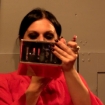Cristina Scabbia, singer of the Italian gothic metal band Lacuna Coil, is about to experience a tarot card reading for only the second time in her life. Her first reading was many years ago, when she was 17. "My friend at school told me that her grandmother was reading tarot and asked would I like to try," she recalls. "We went to this house and she introduced me to her grandmother who looked like a typical old Italian woman, very beautiful with lots of wrinkles that could tell all about her life. She asked if I had a coin or any spare change, explaining that according to tradition a person must give one cent, something, to get a reading. I don't really remember all the details, but what stood out to me was her saying that, in my life, I would have a blond guy and a dark-haired guy. Well, I was 17, and I thought, I hope so! I hope, in my life, to have two men — but not in the same relationship! That memory stuck with me all these years."
Today, she's in Brooklyn, New York, far from her homeland and, coincidentally, the birthplace of tarot. (The oldest surviving set, the Visconti Sforza deck, was created around 1440 for the family of the Duke of Milan, Scabbia's hometown). It's midsummer, and I'm about to read her cards. Tarot, along with practicing witchcraft and gazing up towards the moon, are equal parts cherished pastimes and spiritual compasses for me. Over the past two decades, I've been immersed in the witch world, reading professionally, managing a witchcraft shop and you will often find me crouched down in the back of the occult section of every bookstore I visit. Though I have enjoyed Lacuna Coil's music over the years, Scabbia and I have never met before — it's often helpful for me, as a reader, to know very little about the person sitting across from me — and upon our initial handshake, I'm struck by the singer's total lack of pretension and unabashed enthusiasm about having her cards read for the second time in her life.

Scabbia may not use tarot as a practice, but the visual artwork of the cards inspired her and Lacuna Coil in making their new, ninth album, Black Anima, the deluxe edition of which comes with a limited-edition custom deck, created with the help of artist Micah Ulrich. "We all love the art and thought, 'Let's create our own set of cards,'" Scabbia says. "Each song [on the album] is tied to a card."
Like tarot, which is both an ancient system of divination and a tool for self-exploration, Black Anima aims to plumb the depths of the human consciousness. The word "anima" means "soul" in Italian, after all. Yet, Scabbia explains, "In English, 'Black Soul' wouldn't sound the same. In Italian, anima is us, it's something bigger, it's everyone, it's an army, something stronger." It's a fitting title then: Lacuna Coil released their debut album, In a Reverie, in 1999, and over the intervening 20 years, they have become something stronger themselves, and built their own army of dedicated fans.
As Scabbia and I sit down with the 78 cards, I discuss my approach to tarot as I would with any new client. The tarot, I explain to her as she deftly shuffles my worn-out Aquarian Deck, reveals messages from our subconscious through archetypes and shows us the present situation, offering pathways towards decision-making for our future. While I do think tarot can reveal glimpses of our impending fate, I don't rely or focus on the divination aspect during readings. After cutting the deck three times, I ask her to place her hand on mine and we engage in a brief, grounding meditation, something to help both of us focus, center and connect. Her energy feels electric, direct and game for anything. When we open our eyes, she says she feels better already and we relate about hating the way our voices sound, although her warm tone hints of the powerful singer she is.
I lay out the cards in a Celtic Cross spread as she says, "Hopefully it's good news." The 10 cards reveal a portrait of reincarnation, of someone having walked through the fire, coming out of it, not completely unscathed, and forever changed. The last card, which represents the final outcome, the Six of Pentacles, seems to be radiating like a strobe light. I direct Scabbia to this card and explain how I feel compelled to begin with it as it shows her heading towards a place of divine equilibrium, favors from the Universe and recognition: a card of benevolence and charity, all the goodwill that has been bestowed upon you grants an opportunity to pay it forward to others.
We'll come back to it, but first I turn to the initial two cards pulled, the Five of Pentacles crossed with the Six of Rods. The card placement reveals her recent past contains the Ten of Swords. Some brutal cards, I say, looking at her laser-focused brown eyes. The Ten of Swords shows a murdered, devastated person. I emphasize to Scabbia that this is a place you lived in, a world that felt defeated and hopeless, when the weight of life crushed you. The present card, the first pick, is the Five of Pentacles, a card we all experience especially after starting over. It's typically referred to as the "poverty and illness card," but I direct her attention to the pentacles in the church window, which are symbols of help, if you're able to look up and recognize them. The Five of Pentacles is a card of transition, the couple depicted on it are cold and hungry, trudging through foul weather, desperately trying to get out of their struggle, yet so entrenched in it that they may not see the light in the window offering hope and shelter. When we are still living in a place of our past pain, it can be hard to see a positive future. At this point the singer opens up, saying she can relate.
"We don't see the good things when you're going through bad moments," she agrees. "I always try to get the best out of every situation. I've dealt with the loss of my parents, like, nine months from each other. They were two people I loved the most in the whole universe. We would talk every day. But I just realized it's part of life. Of course you suffer, and I'm going to miss them forever, but they taught me so much. I'm going to carry their legacy. They would never want me to be sad. They would want me to go on. Be happy and live my life. And this helped me so much. … You learn that when [tragedy] happens, you deal with it in a completely different way than you were expecting, and you really find a different energy inside of you that pulls you out of the dark. If you want. If you want, because a lot of people get lost in the dark, and I'm grateful that I followed that light and I was like, 'You know what? I'm not going to give up, because they wouldn't want me to.'"
Crossing the Five of Pentacles is the card of victory, the Six of Rods, which shows a rider atop a horse on her way to triumph. The card below, which I always refer to as our subconscious "witch gut," is the hard-working Eight of Pentacles, while the card above the initial cross shows the joyful Ten of Cups. In the witch gut of her subconscious, Scabbia has been building her empire, but the Eight of Pentacles begs the question: What is there to master now? How can we expand upon our success, finding new delights in work? Above her lies the Ten of Cups showing a happy family dancing under a rainbow, a celebration of loving emotion and community, something she has that is sustainable and nourishing. She smiles, says this is true, reflecting on the incredible network of people in her life. In the near future, along the steps towards the final outcome, is another transitional card, the Five of Cups. I tell her that at this moment in time, coming from a wounded place en route towards victory, with a new stride and a new album, it's only natural for her to get stuck in her past emotions, as they are our greatest teachers. The Five of Cups shows a person in private mourning after experiencing grief and loss. Yet there are two upright and full cups next to the mourner as he continues to drown in misery. I ask Scabbia to pay attention to these two cups — not the three spilled ones — for they are here to provide opportunity and comfort.
"Wow," she exclaims. "This is great advice because we can get lost thinking about how it could have been, what did I do wrong, and this happens to me a lot of times because I am very — how can I say — very critical of myself. I always tend to put the guilt for things on myself. Then I think, Oh, it is my fault? It might be surprising for a lot of people, because they only see the shiny part. But they don't know, it happens to us, as well, us on the [magazine] covers, we also feel lost and alone and not feeling like we're enough. It's part of human nature."

I draw her attention to the final four cards, representing her, the environment, hopes and fears and the final outcome, the momentum of our reading and time together feels like it is reaching a peak moment. That's the thing with tarot: It's intimate, alive, a powerful energy exchange between two people in a specific moment in time. Seeing her in the Five of Swords, I ask Scabbia if there is one thing she can do for herself is to put down the sword — she doesn't need it anymore. Another card of transitions, this one about mental energy, communication and criticism, it suggests that it's time to put to rest a feeling of defensiveness, of needing to stay armored because what are you still fighting against? Are you really battling yourself? I assure her that no one needs to know the specifics of her inner mind's battles, but it's time to let them go. I give her a metaphor of entering a beautiful chapter — say a beautiful room filled with balloons and you feel the need to pop every single one before someone else does. She jumps in at this point, sighing, "Just let it go."
"I can be very defensive and I'm a super open person, but at the same time I'm such a misanthrope, as well," she continues. "And this can change so quickly. I may be in the middle of a million people enjoying the party and all of a sudden will say I want to leave. I can be pretty moody, I guess. It's time for self-healing."
As we look at her environment — the Four of Pentacles, a card displaying someone holding onto what they have, fearful of taking a risk — I encourage her to trust that she has earned these pentacles. She deserves them. It's OK to take some professional risks; in fact, this will benefit her in the long term. Don't get caught in the hamster wheel of hell, our everyday comfortable habits and routines; examine them and challenge them. How do you want to grow as a person now?
Everyone's favorite card, the Devil, appears in her hopes and fear category. Scabbia worded it so beautifully earlier in our conversation about how sometimes we can get pulled in and stuck in our darkness. While it's essential to go there and deeply explore it, sometimes we can wallow a little too long. She excitedly interjects, "This is actually surprising because that is actually the concept of this latest record. I want to say it's human nature, it's good and evil, a balance of it, [the] same reason why you can't always have great moments in life, and you're going to be dealing with struggling, [while] at the same time you also have to accept the darkest side of your personality. You have to accept that fact that you're going to hate on someone, you're going to be envious of something. Not to hide it — especially now with social media. Everyone wants to look pretty and amazing and my life is the happiest ever. Fuck no! Because that's how we grow. It would be surreal to have a life that is only perfect."
Holding the card in her hand and smiling, she loves the expression of the figure on this particular Devil card. "He doesn't look evil," she says. "He's just comfortable as it is. He doesn't want to scare you: I'm here. I am different, but I exist. Which is cool because it means acceptance of differences, which is really rare nowadays. Everybody is not ready to accept other people for who they are because they are different."
We end where I started, the final card of equilibrium, favors, charity and recognition, the Six of Pentacles, the scales on the card a symbol of balance. I point out to her the imminent Autumn equinox in September ushering in Libra season: a new start of giving and receiving, a new time for growth and development and of figuring it out for yourself is around the corner. Scabbia wisely says, "I was shaking and now I will find myself."

The reading is finished, and I ask her how she feels, if she has any questions, and I make sure that I've interpreted the energies and archetypes for her in a sensitive manner. "I did relate to pretty much everything you said," she says. "I came from a very dark period of my life. … But I feel so proud about how I went through it. I didn't think I would find the strength in myself to do it. That makes me feel so powerful, like I am bulletproof now. I don't want to say it out loud, but I don't think there will ever be something more painful than the loss of my parents. If I can deal with this, I can deal with anything. Once you go through the darkness and soak it in, you just realize you can do it. Once you embrace it, it can be healing. I found, at my saddest moments, that music saved me. I dug in the deepest, saddest music I could listen to. I cried every single tear out and it was good. I don't want to be afraid to let it out. And I feel great now. I got rid of the negative stuff that was haunting me."
The conversation turned towards religion, her upbringing and how the wheel of life's fate and fortune has led Scabbia to Black Anima. Growing up Roman Catholic, she was raised to "live with good principles," yet in adolescence, she became disenchanted by the hypocrisy of the Church. "I know so many people who would go to church and then leave and act like the worst Christians," she explains. "That's what turned me off. I was searching for answers, and I didn't get the answers I was expecting."
That search for answers has been part of the singer's life ever since, as well as part of Lacuna Coil's art. The band have been celebrating the 20th anniversary of In a Reverie with a series of "119" shows, and I found the number 20 not so coincidental when discussing what is called the Major Arcana, the first 22 cards of the tarot, with Scabbia. The Major Arcana begins with the Fool, numbered zero, depicting a carefree and untainted youth, carrying a bag of life's trouble over his shoulder, sniffing a white rose, a dog accompanying him on his journey. I thought about In a Reverie and how, at the start of their career, they embodied the bold and free "Fool" energy, the album's cover depicting Scabbia and co-vocalist Andrea Ferro as wild, woodland creatures, instilled with the excitement of their newly launched adventure.

Tarot is often referred to as the Fool's journey, and the Major Arcana reveals all the major archetypes and transitions one will encounter many times throughout life. Card 22 ends with the World, a card of completing a chapter, enlightenment and reincarnation. In the context of Lacuna Coil's career, Black Anima feels like it has the gravitas of the World, marking the completion of a two-decade-plus journey and pointing to the future with its fresh, uncharted mysteries. I ask Scabbia if she feels like she is at "the World" at this point in her life.
"I feel like I am at this place, not only because of the new record," she says. "A musician's life always goes through chapters. When people ask me if I'm happy, I always say I feel very serene, which is way better than happiness, because happiness can be volatile and can expire in a few seconds. I feel great because I feel serene. I've finally found some peace. … I feel very protected by loved ones around me. I feel very valued and appreciated for what I am, which is something I looked for quite a long time. And it feels great."













